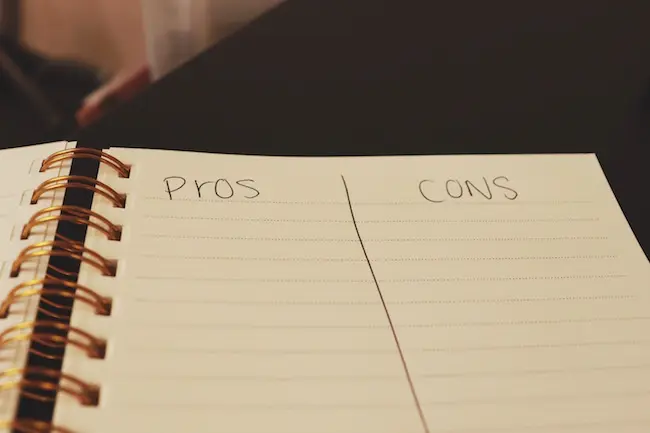Most people looking to hire a property management company in San Diego don’t know what to look for or what to ask. With so many companies to choose from, it can be challenging to narrow down the best company for your home.
At Good Life, we’ve made owning rental property easy for over 1,000 San Diego property owners. We know what you should be looking out for when deciding between companies. These 4 easy steps will help save you time, money, and make the hiring process a lot easier. Be sure to check out the checklist linked at the end of the article.
Step One: Pick 2-3 Companies
There are two main ways people find property management companies: online and via referrals. If you are searching online, try googling things like “San Diego property management” or “best property management companies San Diego.” Peruse through the top 10 results.
Remember, the company’s office doesn’t have to be nearby for them to manage your property. Many owners think that since their home is in Clairemont, they should only search “Clairemont property management.” In actuality, this limits your options and your pool of potential property managers. Most companies will have a page listing the areas and neighborhoods they service, so be sure to check that out.
If you have a friend or family member that uses property management or real estate agents, check with them for any recommendations. They can provide you with personal experiences and let you know what to look out for.
Step Two: Online Reputation Check
Next, you’ll want to check their online reputation on Google and Yelp. Don’t consider any companies with less than 4 stars. Having 4 or more stars shows that the company is committed to excellence and they care about their customers’ experience. You want a company that cares about their reputation.
There are some things to know about how reviews work on each platform. Reviews on Google always stick, meaning they don’t get filtered out unless a user reports them. On Yelp, there is an AI that scans for “non-recommended reviews.” These can be reviews that are from accounts that were just created, have no prior reviews, or other miscellaneous reasons that Yelp deems untrustworthy. Ideally the companies you consider should have good reviews on both websites.
Step Three: Phone Call Test
This is an easy way to see how responsive a property management company is. Call them during business hours and see if they answer. You might think this isn’t that important, but we have found that only 20% of companies typically pick up the phone. If they don’t pick up the phone now, how can you be assured that they will when you’re their client? If they don’t pick up during the test, rule them out.
If they do pick up, make sure they can answer your questions.
Step Four: 10 Must-Ask Interview Questions
You likely have your own questions you want to ask your potential property manager. Consider adding in these important questions, too.
1. How is your company set up? Portfolio, departmental, or hybrid?
Most companies are set up one of these three ways. Portfolio means that one person is responsible for all aspects of a set portfolio of properties. They might manage 100 properties and handle the leasing, maintenance, marketing, etc. all themselves.
Departmental means that the company is divided by department. Specific team members are assigned to leasing, maintenance, etc. This allows people to specialize in one area and become experts in that field.
Hybrid is a combination of the two. Certain team members might handle a group of properties but within that they are divided by leasing, maintenance, etc.
2. Who will be my property manager?
Ideally you want a company where you will have a single point of contact. Constantly speaking with multiple people can get confusing and result in miscommunication. Don’t hesitate to ask about this person’s experience in the role and what exactly they will be doing for your property.
3. How many units does my property manager handle?
The answer to this will depend on how the company is structured. As a guide, if they are a portfolio manager, they shouldn’t be managing more than 100-150 units. If they are organized as a departmental model, 450 is the max. Hybrid models should be closer to 350. If they manage much higher than these numbers, it could be cause for concern. You don’t want your property to fall through the cracks.
Another thing to note is that when companies reach 400 units, some restructuring is often needed to adjust to the increase in units managed. This is just something to keep in mind when asking how many total properties they manage.
4. What was your average "days on market" last month?
This is a specific question looking for a specific answer. You want to ask about the most recent month because there should be hard data for this, not a “usually it’s around 15 days!”
5. How are repairs handled?
Ideally you want to be notified of every repair. Most companies have a maintenance threshold, meaning repairs under a certain dollar amount will proceed without your specified approval (usually between $250-$500). They will still notify you of the repair.
Maintenance is an area where you may experience a difference between an expert property manager and a property messenger. A messenger will simply relay info and ask you what to do. An expert manager will inform you of the problem and make a recommendation and a plan. You will be able to trust their advice and let them proceed how they see fit.
Ask if they provide photos of the damage and the repair. You want to be able to see what is going on in your home.
6. Do you inspect the property regularly?
Your property manager should inspect the home at least once a year. They should do a general inspection to see if there is any considerable damage or issues in the home. They should provide a report after this inspection with photos.
7. What are your fees?
Look for a company that uses a percentage for their management fee, i.e. 8% of the monthly rent. This is better than a flat fee ($150 per month) because it provides motivation to the manager to get the best rental price for your home. The same goes for a leasing fee. If the leasing cost is just included and not an additional charge, it can get overlooked or neglected. A leasing fee motivates the manager to get the best possible tenant for the best rental rate.
Their annual inspection should also entail a small fee. When there is no added cost, they often get pushed to the last priority or don’t happen at all.
Commission is like oxygen for a business. When commission is tied to a specific goal or process, the company usually will spend more time and resources on making it better. Remember that when comparing management fees, there will likely be a cost difference of only about $50. Management fees are also tax deductible.
8. Is there a fee to cancel?
This is good to know when signing a management contract. A lot of companies do a one-year contract that turns into a month-to-month contract. Make sure you check for an automatic renewal.
9. What will my property rent for?
With a few pictures and your address, your manager should be able to give you a rent estimate within roughly 10% of what the home will rent for. You want a detailed analysis with data to back it up, such as a rental report. If they provide you with a wide range, i.e. $2,000-$2,600, that isn’t what you’re looking for. A good manager will want to nail down the market rent early on in the process. Make sure you are on the same page.
10. How much will I spend on maintenance in the first year?
Maintenance costs can vary depending on the age and condition of your home, but by asking this you can prepare for upcoming expenses, even if it’s just an estimate. First you’ll want to know what the cost will be to make the home rent-ready. The home will need a good cleaning and likely a few repairs/upgrades to be ready for the market. There will be things you expected, such as carpet and painting improvements, but there will also be things like rekeying the home and landscaping that you might not think of.
You can often estimate a budget based on how old the home is. For a home less than 10 years old, setting aside 3% of the annual rent income makes sense. For 10-25 years old you can estimate 5%; 25-50 years, 8%; 50+ years old, 12%.
Other Things to Consider
Transparency
In 2021, you should be able to find all of the information you’re looking for on the company’s website. If it’s hard to find their pricing, this is a red flag. There’s nothing more frustrating for a potential customer than searching the website for answers and not finding any. You should be able to easily find things like available properties, management services, and a contact page.
Keep an eye out for educational content as well, such as a blog or FAQ page. This can show you how much they know about the industry, the market, and local laws.
Transparency also extends once they are hired. You want to feel like your manager is keeping you in the loop on important matters and feel like you know what is going on with your property.
Number of Reviews
We already talked about the importance of online reputation. In addition to making sure they have at least 4 stars, you should also pay attention to the number of reviews they have. A 5-star company is great, but if they only have 10 reviews, it will be harder to get an accurate depiction of what their service is like. This isn’t a deal breaker, just something to keep in mind when searching.
Website
Not only should you be able to find their pricing on their website, you should be able to navigate through pages easily. We are in the digital age, and if their website is outdated or difficult to browse, it might indicate a lack of organization.
Check out their available property listings while you’re at it. Do they take good photos and videos? Do they have good descriptions of the properties? This is how they are going to market your home, so take note.
Experts in the Industry
Good property managers will be knowledgeable about property management, their company stats, and the local market. They should be able to provide you with information on the following:
- Average length of tenancy
- Days on market
- Average rent range for different neighborhoods
- Average cost to make the average home rent-ready
- Number of leases signed per month
- Vacancy rate
As mentioned above, asking for their days on market for the most recent month can show you how well and how often they track their own metrics.
You want a company that is not only knowledgeable about their own processes and systems, but also about the changing real estate market and local laws that affect your property. Within the last two years, San Diego has seen many laws and regulations affect rental properties: AB 1482, SB 91, and Proposition 19, to name a few. One of the main benefits of hiring a manager is that they are responsible for adhering to these laws and keeping you informed of changes.
That’s it! Four easy steps to hiring a property manager for your San Diego home, plus some additional things to look out for. Don’t forget to download the checklist and check out our expansive guide on how to hire a property manager!
If you found this article helpful, follow us on social media. We post daily tips to help you manage your own rental property:
Steve Welty
Subscribe to our Weekly Newsletter
Join the 5k+ homeowners receiving Local Law Updates and Landlord Tips. Delivered to your inbox every Saturday at 6am PST.
Share this:
Get in touch with us:
We make owning rental property easy.
Choose Your Next Step
Good Life Blogs
We believe that education is empowering.
Pros and Cons of Hiring a Property Management Company
Read about the pros and cons of using a property management company to manage your rental properties. In this article, we touch on what makes a property management company beneficial but also why some people might be hesitant to hire.
Pros and Cons of Rent Control
The subject of rent control has become increasingly popular over the last couple decades. As rent prices continue to skyrocket across the country, more and more tenants get priced out of their homes and neighborhoods. This is why the majority of tenants are in favor of…
Section 8 in San Diego: How It Works
Rental assistance in San Diego is a hot topic as of late. Many landlords and property managers have heard of Section 8, but don’t know all the ins and outs of the program. As of January 2020, all landlords and property managers are required to accept Section 8 housing vouchers as a form of income…









